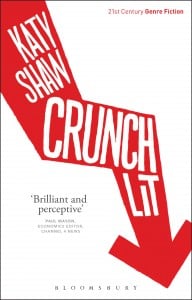Crunch Lit author Katy Shaw: “Capitalism is no longer evolving”
October 22, 2015

Katy Shaw is the author of a new book, Crunch Lit, which discusses a body of fiction writing that has arisen analysing the financial crisis, and looks to place the movement in context alongside other literary representations of the role of finance in society. On 6th November she hosts an all-day event at Leeds Beckett University, with a lineup that includes Channel 4 Economics Editor Paul Mason, on the theme of post- capitalism. Shaw talks to Jack Simpson about the book and the future of capitalism.
What do you think would be the defining features of a post-capitalist period?
The current system is not working. Evidence of this has been developing and becoming more visible, but in the 21st century it’s now impossible to ignore. The failure of the capitalist system – and in particular of neoliberalism as a framework – is breaking out nationally in devolution movements and new social protests groups as well as internationally in Syria and Ukraine, and the problems in Greece and Spain. A period that moves beyond that will be a more honest period because admitting there is a problem is an important step in changing things.
What makes you think that capitalism and other power structures won’t simply remould themselves and emerge from the current unrest largely in tact?
Capitalism has traditionally been understood as evolutionary – like a living organism it would adapt and shape itself to survive. That has now stopped. Capitalism is no longer evolving, and as a result we are seeing fissures where the lack of development in pace with contemporary contexts is revealing the system to be lacking. A post-capitalist state will not emerge (in my opinion) in revolution, but rather a transition that occurs over time from within the current systems – and this is where I, and others, part way with previous Left-ish thinking on this.
You seem to believe that writers of fiction can unearth truth where non-fiction writers have gone astray. Aren’t both approaches powerful in their own way? You’re not, I presume, saying that fictional writing is more able to describe the behaviour of financial markets than empirical writing.
Fiction has a very different capacity to classical reportage when attempting to represent or understand the reasons behind, events during, and implications of, a financial crisis like that of 2008. What I argue in the book is that rather than functioning as a passive reflector of those events, fiction writers stepped up to not only actively engage with the discourses circulating during this era-defining period, but also reframed the purpose of fiction, and especially the novel form, in a post-crash society in which culture was bashed by austerity cuts and widespread questions regarding notions of ‘value’.

In what sense do you think the credit crunch is ultimately an ethical tale, a narrative about where certain ethical beliefs (a faith in individualism, for example) leads us?
There are certain fictional and autobiographical narratives – the post crunch years saw a lot of ex-bankers writing about their experiences as markets crashed. There was an attempt to suggest the whole thing was a giant ethical lesson. However, most of the fictional representations of this period suggest things are far more complicated, that in reality humans are not that neat and simple. Many novels about the crunch end with bankers returning back to work unscathed and unchanged in their behaviour and practices.
How do you see your and Paul Mason’s work fitting together?
We’re both coming from this at slightly different angles – Paul’s book is a thinking document on how we could possibly move toward a post-capitalist society, mine is a study of cultural representations of the crash – but both are part of a wider discourse thats been emergent for a while but is growing in voice across the world that seeks to debate alternatives to the current.
How possible is the success of a fundamentally left leaning government with a different agenda to global bodies like the IMF, the World Bank, and the EU?
It is possible, but only if those institutions acknowledge the power of these movements and shifts at global levels. We have been forced to witness Greece being spectacularly and publicly punished for daring to push an alternative, for exposing the role of Germany in the EU, and for holding up the European Central Bank for the draconian institute that it is. Their punishment was political, their cause will run and run. Power shifts, things can – and will – change, as a certain new Labour leader mentioned in his acceptance speech. Instead of looking to the shifts in Greece with horror – as the media often suggest we should – we should instead be thinking about why they are happening, and how we can learn from them to reconsider our own relationship with these bodies, and also what we want as a society for the future.
Katy Shaw is the Principal Lecturer in Contemporary Literature at Leeds Beckett University. Crunch Lit is published by Bloomsbury on 22nd October. Information about Katy Shaw’s event, ‘Post-Capitalism 2015: Rethinking Crisis, Culture, and Politics’, can be found at http://www.leedsbeckett.ac.uk/events/ faculty-events/postcapitalism-2015-rethinking-crisis-culture-and-politics-all-day- event/

Comments